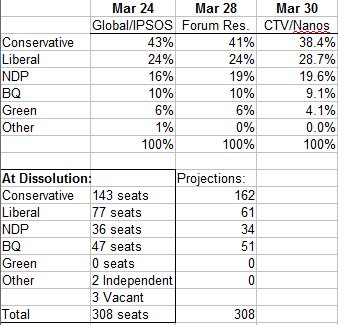Andrew Potter pokes fun at the widely rumoured merger discussions that may or may not result in a combination of the Liberals and the New Democrats:
So here’s what I think, for what it matters to anyone: It’s a stupid idea. Not just stupid as in don’t-eat-that-fifth-taco stupid, but deeply, profoundly, moronic. If it were to come to pass, the only, and I mean only, beneficiaries would be the Conservatives. The NDP would lose, the Liberals would lose, and, more than anything, Canadians would lose.
[. . .]
The problem with the Liberals is not that their voter base it is divided, it is that their voter base has left them. And the reason their voter base has left them is because the Liberals have been acting like humungeous bozos for most of this decade. It is really not much more complicated than that. The former Natural Governing Party transformed itself into the Party of Humungeous Bozos, and if there is one thing Canadians have shown over the years is that you can’t get elected if you are a humungeous bozo. You can be an arrogant jerk (Trudeau), a slimeball (Mulroney), a gangster (Chretien) or a paranoid control freak (Harper), but the Canadian body politic is powerfully immune to bozos.
While I wouldn’t say it’s impossible, I’d expect the NDP rank-and-file to object strenuously to anything more than a tactical agreement to avoid running directly against the Liberals. The NDP, although I disagree with much of what they stand for, at least do believe in something. The only thing the Liberals stand for is their belief that they should be running the country.
Update: Steve Janke thinks it could be an ugly, ugly scenario indeed:
And there are plenty of senior Liberals utterly appalled at the idea of a merger, I think because they realize the NDP, though smaller, is more ideologically pure, and that the NDP would pull the merging Liberals leftward (though the NDP purity would itself be diluted, something the NDP membership would be worried about, and would probably struggle hard against). The new party would be much more NDP than Liberal.
These appalled Liberals would fight hard against a merger at a Liberal convention, and it seems to me that the Liberal Party could tear itself apart in a very ugly and public way.
Let’s say the merger amendment fails. What then? We could see a chaotic abandonment of the Liberal Party by disaffected Liberals (remember, I dialled the chaos way up on the scenario-a-tron). As of yesterday, the existence of Liberal-NDP merger talks is public knowledge. Even if it isn’t true, people now believe it to be true. The pro-merger Liberals in the rank-and-file might not accept a failure of those talks or a failure to accept a constitutional amendment to make a merger official. If they see their dream snatched away, we could see large numbers of Liberals tearing up their membership cards and switching parties, especially if they are led by someone like Bob Rae tearing up his membership card first.




